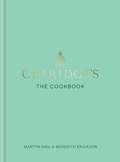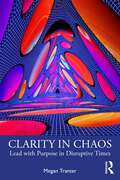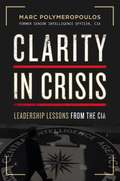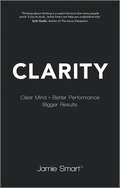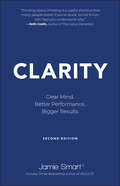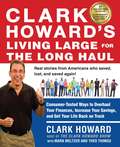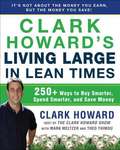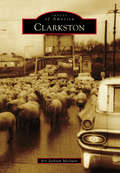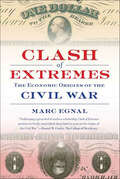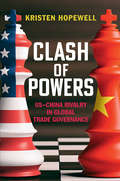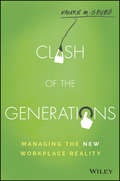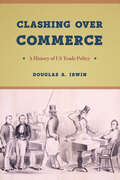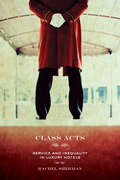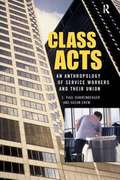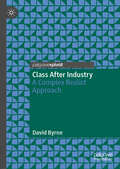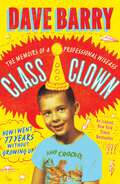- Table View
- List View
Claridge's: The Cookbook
by Meredith Erickson Martyn Nail"...not that I intend to die, but when I do, I don't want to go to heaven, I want to go to Claridge's" Spencer Tracy "I love to check myself into Claridge's now and then for a few nights - just to spoil myself" Jade Jagger "When I pass through the revolving doors into the glamorous lobby of Claridge's in London, I always feel a thrill. You enter a world of sophistication and wonderful service... Claridge's is my ultimate treat." Lulu Guinness"It's the best in the world" Alex JamesAn art deco jewel set in the heart of London's Mayfair, Claridge's - one of the world's best luxury hotels - has long been known for inspiring menus and exceptional dining from breakfasts and elevenses, through lunch and afternoon tea, and on to drinks, dinner and the dessert cart. Claridge's: The Cookbook celebrates that heritage in style, with a collection of over 100 of the best-loved dishes and drinks from The Foyer and Reading Room, the Bar and The Fumoir. With interludes ranging from the magic of Christmas to how to host dinner for 100, the extraordinary experience of dining at Claridge's is brought to life in book form. The book will include delectable dishes and drinks for every time of day: from the Arnold Bennett omelette, to the Lobster, langoustine & crab cocktail and the Smoked duck salad. Treats include Cheddar Eccles cakes and a Raspberry marshmallow. Savour everything from the prized Claridge's chicken pie to a slice of Venison Wellington, with some Truffled macaroni gratin or Pommes château. Share the essence of Claridge's with family and friends, in the comfort of your own home - and enjoy!
Clarify What's Important to You: Leadership with Authenticity
by Stewart D. FriedmanThe essence of acting with authenticity is in knowing what you care about and then doing your best to be true to these values and aspirations. The exercises you'll do in this chapter will help you articulate these most important aspects of your life's purpose, and provide the foundation for the journey to Total Leadership.
Clarifying and Measuring HR's Strategic Influence: Introduction to a Seven-Step Process
by Dave Ulrich Brian E. Becker Mark A. HuselidIn order to achieve strategy alignment, managers must first understand how value is created in their firm, and then must develop a measurement system based on that value chain. This chapter offers a seven-step process to help integrate HR into a business-performance measurement system, emphasizing the importance of a strategically focused HR architecture as a prerequisite. The seven steps for implementing HR's strategic role range from clearly defining business strategy and creating a strategy map, to aligning the HR architecture with HR deliverables and designing a strategic measurement system.
Clarion Optical Co.
by Michael J. Roberts Howard H. StevensonFocuses on two individuals' attempts to purchase Clarion Optical Co. Forces students to consider alternative proposals for financing the purchase; generate pro forma cash flows to assess the feasibility of these proposals; estimate the sources and magnitude of financial return to each of the involved parties; and assess the advantages and disadvantages of the proposals. A rewritten version of an earlier case.
Claritas Genomics
by Matthew Preble Robert F. HigginsClaritas Genomics was formed in January 2013 when BCH spun out its Genetics Diagnostic Lab into a fully commercial entity. Claritas offered over 100 genomic tests to detect a range of conditions, including autism and intellectual disabilities, and was developing new tests that provided clearer and more relevant information for physicians to use in treating patients. Claritas wanted to increase the speed at which genomic research discoveries occurred and translate this research into better diagnostic tests. To achieve this, it planned to collaborate with other children's hospitals through a research network it was developing. BCH was the company's majority owner, and Life Technologies (Life), a major manufacturer of sequencing equipment and services, was a minority owner. By the end of the year the CEO of Claritas Genomics, Dr. Patrice Milos, had to put Claritas in a position to grow and needed to have in place the software and IT platforms-the databases, search tools, and other programs-that would help the company reach scale.
Clarity in Chaos: Lead with Purpose in Disruptive Times
by Megan TranterWith its fresh and deeply personal perspective on what it takes to lead with resilience and authenticity, this book challenges the traditional playbook on leadership by placing purpose at the core of every decision and action.In a world increasingly defined by uncertainty and rapid change, leadership grounded in purpose is the compass that transforms uncertainty into impact, stagnation into growth, and vision into a legacy. Drawing on her extraordinary journey from technical safety expert to global executive, Megan Tranter weaves together compelling personal anecdotes, cutting-edge research, and practical tools to show how leaders can redefine success. But this book goes beyond strategies to invite readers into an authentic dialogue about vulnerability, growth, and the kind of leadership that transforms lives – not just spreadsheets. Readers will be left feeling understood, inspired, and empowered to take courageous actions in their careers, solving the pervasive problems of burnout, disconnection, and lack of fulfillment.This book is the roadmap for seasoned executives and aspiring leaders to unlock their potential and lead with clarity and conviction.
Clarity in Crisis: Leadership Lessons from the CIA
by Marc E. PolymeropoulosMeet your next crisis head on and come through it stronger than ever by using the hard-earned strategies and core principles from Marc Polymeropoulos, a highly decorated, 26-year operations officer with the CIA.Marc Polymeropoulos has had to live with the consequences of decisions made under the most high-stress circumstances you can imagine as a senior intelligence officer in the CIA, retiring from his 26 years of service as one of the CIA&’s most decorated field officers.Though your crisis situations may not entail international counter terrorism as Marc&’s did, in our age of social media and a 24-hour news cycle, the consequences of mishandling a crisis can escalate quickly, leaving irreparable damage to a company&’s reputation and bottom line in its wake.In Clarity in Crisis, Marc shares how true leaders need to lead in and through times of crisis and thrive under conditions of ambiguity, rather than message their way out or duck from hard decisions. Far from mere theory, Marc outlines the unique and specific mindset and strategies he himself practiced and honed throughout his remarkable career.Clarity in Crisis provides proven strategies and core principles that leaders can apply to meet any crisis head on and lead through it, including: The critical elements to managing crisis, such as knowing who you can always count on to execute under high-stress situations.An understanding of the importance of following and stressing key fundamentals and avoiding shortcuts that often do more harm than good.Implementation guidance from the &“Mad Minute&” section at the end of each chapter that summarizes key points and action items you can begin applying right away. How to gain confidence that you are ready for the next crisis, wherever it comes from, and embrace less than ideal situations with no fear, using the core principles outlined in these pages to find unshakeable clarity in crisis and lead when others want to flee.
Clarity: Clear Mind, Better Performance, Bigger Results
by Jamie SmartLEARN TO CLEAR YOUR MIND AND THINK LIKE A WINNER We all have so much going on. A million different projects, to-do lists longer than your arm. We all worry about things – money, deadlines. With all this buzzing around in our heads it’s often a nightmare trying to concentrate on one thing. What if someone could show you how to empty your mind of all the noise? If you could be shown how to de-clutter your mind and concentrate on one important thing? Well Jamie Smart, state-of-mind specialist, can do just that – with Clarity he will show you how to get real clarity of thought. You’ll learn how to clear your mind and become less stressed and more productive – and as a result, more confident in your abilities. Clarity will help you to: • Greatly improve your concentration and ability to think clearly • Reduce stress levels and increase productivity • Grow your confidence and self-belief • Find innovative solutions to problems and make progress on goals and dreams • Trust your intuition and improve your decision-making • Build stronger relationships through better communication Praise for Clarity: “Thought-provoking, entertaining, and potentially life changing – highly recommended!” Michael Neill, Radio Show Host and Author of The Inside-Out Revolution: The only thing you need to know to change your life forever “A powerful, positive book that can help you to achieve more than you ever thought possible, in every area.” Brian Tracy, Author of Goals and Eat That Frog “I highly recommend this book to anyone trying to deal with life stressors and find true wisdom and well-being." Mark Howard, Ph.D., Clinical Psychologist, ThreePrinciplesInstitute.org “Take your time reading this profound book. Jamie Smart is about to blow apart every circumstantial excuse you ever came up with. He’s about to put the steering wheel back in your hands.” Garret Kramer, Founder of Inner Sports and Author of Stillpower “The insights you’ll get whilst reading Clarity will resonant in how you manage day to day but, more importantly, provide a framework for refreshing your priorities, goals and drive.” Peter Lake, Group Business Development Director, JS Group “The world of leadership, sales and customer engagement has changed radically over the past ten years. People are more savvy, better informed and sick of the same old story. Jamie Smart cuts through the noise of the marketplace and shows you what really works. Profound, practical and instantly applicable; Clarity is essential reading if you want to make your mark in the 21st century.” Paul Charmatz, Former Managing Director, Camelot “Jamie, you really hit the bullseye with this brilliant book; it’s a must-read for everyone who wants clarity of mind.” Joe Stumpf, Founder of By Referral Only and Author of Willing Warrior “Jamie Smart takes an outdated paradigm of success and turns it on its head. Pull up a chair, get a copy of Clarity and discover how you can experience an exponential increase in clarity and quality of life.” Rich Litvin, co-author of The Prosperous Coach and Founder of The Confident Woman’s Salon “Jamie Smart is brilliant! In his book Clarity, he has unlocked an insight into the real-life matrix. Be ready to have your world turned inside-out because, as Jamie so effortlessly demonstrates, this is how it works.” Richard Enion, Dragon’s Den Winner, BassToneSlap.com and R
Clarity: Clear Mind, Better Performance, Bigger Results
by Jamie SmartAchieve unheard-of results by focusing your mind and achieving real clarity of thought In the newly revised Second Edition of Clarity: Clear Mind, Better Performance, Bigger Results, renowned speaker, writer, and coach Jamie Smart delivers a practical roadmap to turning that infinitely long to-do list into manageable and focused tasks. In the book, you’ll learn to de-clutter your mind and concentrate on one important thing at a time. You’ll also discover how to clear your mind, become less stressed, and achieve greater levels of productivity. The author shows you: New case studies—and updates to case studies appearing in the first edition—that highlight the strategies contained in the book New diagrams and formulae that make it easier to eliminate the noise and focus on what’s critical Peer-reviewed research that forms the foundation of the evidence-based techniques discussed withinClarity: Clear Mind, Better Performance, Bigger Results is an essential read for executives, managers, and other business leaders looking for major productivity and efficiency gains for themselves, their organizations, and their staff. It’s also a must-buy for the leaders of innovation and business development teams seeking to unlock a new level of results.
Clark Howard's Living Large for the Long Haul
by Clark Howard Mark Meltzer Theo ThimouThe follow-up to Clark Howard's #1 New York Times bestseller, Living Large in Lean Times, offers no-nonsense financial tips for achieving lifelong prosperity Americans from all walks of life are still feeling the roller-coaster effects of the Great Recession. For many, home values are still too low and unemployment is still too high. Others have prospered despite the ups and downs. In Clark Howard's Living Large for the Long Haul, the renowned broadcaster examines our new paradigm through the eyes of those whose financial portfolios have beaten the odds, and those whose economic situation has gone off course. Through these fascinating personal accounts, readers uncover amazing opportunities and smart decisions, finding advantages in bleak times for lasting payoffs in the long run.
Clark Howard's Living Large in Lean Times
by Clark Howard Mark Meltzer Theo ThimouClark Howard is a media powerhouse and penny-pincher extraordinaire who knows a thing or two about money. A lifelong entrepreneur who is now the hugely popular host of a talk radio program and television show and the bestselling author of several books, Clark consistently delivers expert financial advice to his wide and devoted fan base.Living Large in Lean Times is Clark's ultimate guide to saving money, covering everything from cell phones to student loans, coupon websites to mortgages, investing to electric bills, and beyond. In his candid and friendly next-door-neighbor manner, Clark shares the small, manageable steps everyone can follow to build a path towards independence and wealth. Chock-full of more than 250 invaluable tips, the book outlines how to: Locate missing and unclaimed money in your name Lower your student loan payment Find legitimate work-at-home opportunities Get unlimited texting and e-mailing for less than $10 per month Know what personal info not to post to social media sites Determine the best mortgage rate, and much, much more As Clark demonstrates, there are myriad ways to reduce debt, buy smarter, and build a future. Follow his lead and he'll get you there.
Clark Material Handling Group-Overseas: Brazilian Product Strategy (A&B) (Condensed)
by Robert J. DolanAssumes some knowledge of conjoint analysis. Permits analysis of basic results and dynamic market simulations in one class session.
Clarks at a Crossroads (A)
by John A. Davis Suzanne StrohClarks at a Crossroads (A) describes how this venerable British shoe company falls behind its competition and into financial trouble. The case ends with a pivotal vote by shareholders on whether to sell this family company.
Clarks at a Crossroads (B)
by John A. Davis Suzanne StrohClarks (B) summarizes the results of the shareholders vote described in the (A) case.
Clarks at a Crossroads (C)
by John A. Davis Suzanne StrohClarks (C) describes the turnaround of C&J Clarks Ltd., 1993-2002. It describes the roles of family chairman Roger Pedder, and CEO Timothy Parker, in this successful effort.
Clarkson Lumber Co.
by Thomas R. PiperThe owner of a rapidly growing retail lumber company is considering the financial implications of continued rapid growth. The magnitude of the company's future financing requirements must be assessed in the context of the company's access to bank finance and/or equity finance. A rewritten version of an earlier case.
Clarkston
by Jeri Jackson McguireClarkston, Washington, and Lewiston, Idaho, are twin cities that meet at the confluence of the Snake and Clearwater Rivers in southeast Washington. Gold was discovered upstream in the Clearwater drainage in 1860. A few settlers crossed the Snake River to an area called Jawbone Flats. It was flat and covered with sagebrush. Thirty years later, investors from back East arrived with big plans. C. Van Arsdol designed the first irrigation system, and Charles Francis Adams was a big influence in bringing irrigation and education to Clarkston. By 1899, Clarkston became prosperous with their award winning fruit orchards. In 1896, Edgar H. Libby received the franchise to build a bridge to connect with Lewiston, Idaho. The name finally became Clarkston in 1902, when the town was incorporated. In the 1970s, slack water brought big changes to the area called the "Banana Belt." With the dikes and the smooth waters, the valley became an ideal place for boating, fishing, and tourism.
Clash of Extremes: The Economic Origins of the Civil War
by Marc EgnalClash of Extremes takes on the reigning orthodoxy that the American Civil War was waged over high moral principles. Marc Egnal contends that economics, more than any other factor, moved the country to war in 1861.Drawing on a wealth of primary and secondary sources, Egnal shows that between 1820 and 1850, patterns of trade and production drew the North and South together and allowed sectional leaders to broker a series of compromises. After midcentury, however, all that changed as the rise of the Great Lakes economy reoriented Northern trade along east-west lines. Meanwhile, in the South, soil exhaustion, concerns about the country's westward expansion, and growing ties between the Upper South and the free states led many cotton planters to contemplate secession. The war that ensued was truly a "clash of extremes."Sweeping from the 1820s through Reconstruction and filled with colorful portraits of leading individuals, Clash of Extremes emphasizes economics while giving careful consideration to social conflicts, ideology, and the rise of the antislavery movement. The result is a bold reinterpretation that will challenge the way we think about the Civil War.
Clash of Powers: US-China Rivalry in Global Trade Governance
by Kristen HopewellThe US-China trade war instigated by President Trump has thrown the multilateral trading system into a crisis. Drawing on vast interview and documentary materials, Hopewell shows how US-China conflict had already paralyzed the system of international rules and institutions governing trade. The China Paradox – the fact that China is both a developing country and an economic powerhouse – creates significant challenges for global trade governance and rule-making. While China demands exemptions from global trade disciplines as a developing country, the US refuses to extend special treatment to its rival. The implications of this conflict extend far beyond trade, impeding pro-development and pro-environment reforms of the global trading system. As one of the first analyses of the implications of US-China rivalry for the governance of global trade, this book is crucial to our understanding of China's impact on the global trading system and on the liberal international economic order.
Clash of the Generations: Managing the New Workplace Reality
by Valerie M. GrubbCase studies and strategies for more effective multi-generational management Clash of the Generations explores this new and increasingly common workplace phenomenon, and provides strategies to help managers navigate this ever more complex maze. Traditionally, older workers would retire and make room for the next generation; instead, Baby Boomers are now prolonging their time in the workplace, yet the successive generations are still coming in. Senior leaders are now left to manage a blended workplace comprised of up to four generations--each with their own ideas of work ethic, work/life balance, long-term career goals, and much more. Management is challenging at the best of times, but the new prevalence of generation gaps--sometimes even layered--add an entirely new dimension to an already complex responsibility. This book presents case studies and interviews with representatives of companies with age-diverse workforces, detailing innovative strategies for smoothing out the bumps and helping everyone work together. Managers have long wished that their positions came with an instruction manual, and this book delivers with a host of effective inter-generational management strategies illustrated by real-world companies. Manage the multi-generation workplace more effectively Navigate the generational culture clash Adopt proven strategies for helping everyone get along Promote a more positive culture amidst clashing expectations Every generation in the workplace has value, each has their own strengths, their own weaknesses, and their own unique talents. Each is indispensable, and when they come together as a synergistic force, they can be unstoppable. Effective management means bringing out the best in your workforce, and the strategies presented in Clash of the Generations help you streamline your varied workforce into a team more valuable than the sum of its parts.
Clashing over Commerce: A History of US Trade Policy (Markets and Governments in Economic History)
by Douglas A. IrwinShould the United States be open to commerce with other countries, or should it protect domestic industries from foreign competition? This question has been the source of bitter political conflict throughout American history. Such conflict was inevitable, James Madison argued in The Federalist Papers, because trade policy involves clashing economic interests. The struggle between the winners and losers from trade has always been fierce because dollars and jobs are at stake: depending on what policy is chosen, some industries, farmers, and workers will prosper, while others will suffer. Douglas A. Irwin’s Clashing over Commerce is the most authoritative and comprehensive history of US trade policy to date, offering a clear picture of the various economic and political forces that have shaped it. From the start, trade policy divided the nation—first when Thomas Jefferson declared an embargo on all foreign trade and then when South Carolina threatened to secede from the Union over excessive taxes on imports. The Civil War saw a shift toward protectionism, which then came under constant political attack. Then, controversy over the Smoot-Hawley tariff during the Great Depression led to a policy shift toward freer trade, involving trade agreements that eventually produced the World Trade Organization. Irwin makes sense of this turbulent history by showing how different economic interests tend to be grouped geographically, meaning that every proposed policy change found ready champions and opponents in Congress. As the Trump administration considers making major changes to US trade policy, Irwin’s sweeping historical perspective helps illuminate the current debate. Deeply researched and rich with insight and detail, Clashing over Commerce provides valuable and enduring insights into US trade policy past and present.
Class Acts
by Rachel ShermanIn this lively study, Rachel Sherman goes behind the scenes in two urban luxury hotels to give a nuanced picture of the workers who care for and cater to wealthy guests by providing seemingly unlimited personal attention. Drawing on in-depth interviews and extended ethnographic research in a range of hotel jobs, including concierge, bellperson, and housekeeper, Sherman gives an insightful analysis of what exactly luxury service consists of, how managers organize its production, and how workers and guests negotiate the inequality between them. She finds that workers employ a variety of practices to assert a powerful sense of self, including playing games, comparing themselves to other workers and guests, and forming meaningful and reciprocal relations with guests. Through their contact with hotel staff, guests learn how to behave in the luxury environment and come to see themselves as deserving of luxury consumption. These practices, Sherman argues, help make class inequality seem normal, something to be taken for granted. Throughout, Class Acts sheds new light on the complex relationship between class and service work, an increasingly relevant topic in light of the growing economic inequality in the United States that underlies luxury consumption.
Class Acts: An Anthropology of Urban Workers and Their Union
by E. Paul Durrenberger Suzan EremAmerican labor leaders are constantly developing new programs to revive the union movement. What happens when these plans collide with the daily lives of front-line union staff and members? This book examines the often conflicting interests of key players in the trenches of a national effort to bring back the American labor movement. Brutally honest, funny, never dull, this anthropological ethnography shows the daily struggles of union members today to bring about positive change and hold together their urban labor union in an era of globalization, outsourcing, and deindustrialization. A union activist and an anthropologist (the authors) pair up to offer insideoutside views of labor unions and of how anthropological fieldwork is done. Explaining, coaching, and warning Paul of hazards, Suzan, the communications director for the Local, provides inside views and details of day-to-day interactions. Paul, the anthropologist, provides outside analytical views that related Suzan's experiences and his own observations to the wider view anthropology offers through ethnography, holism, and comparativism. The result is a story of one dynamic union local, one anthropological study, and the lit fuse that connects them until the end.
Class After Industry: A Complex Realist Approach
by David ByrneThe transition to twenty-first century post-industrial capitalism from the ‘welfare’ industrial capitalism of the twentieth century, has affected the ways in which class is lived in terms of relational inequality and the factors that structure identity. Class After Industry takes a complex realist approach to the dynamics of individual lives, places, the social structure and analyses their significance in terms of class. A wide range of quantitative and qualitative studies are drawn on to explore how ‘life after industry’ shapes class, and the consequent potential for social change. The book will be of interest across the social sciences and beyond, to those concerned with how class forms might translate into political action.
Class Clown: The Memoirs of a Professional Wiseass: How I Went 77 Years Without Growing Up
by Dave BarryAmerica’s most beloved wiseass finally tells his life story with all the humor you’d expect from a man who made a career out of making fun of pretty much everything. <P> How does the son of a Presbyterian minister wind up winning a Pulitzer Prize for writing a wildly inaccurate newspaper column read by millions of people? In Class Clown, Dave Barry takes us on a hilarious ride, starting with a childhood largely spent throwing rocks for entertainment—there was no internet—and preparing for nuclear war by hiding under a classroom desk. After literally getting elected class clown in high school, he went to college, where, as an English major, he read snippets of great literature when he was not busy playing in a rock band (it was the sixties). <P> He began his journalism career at a small-town Pennsylvania newspaper where he learned the most important rule of local journalism: never confuse a goose with a duck. His journey then took a detour into the business world, where as a writing consultant he spent years trying, with limited success, to get corporate folks to, for God’s sake, get the point. Somehow from there he wound up as a humor columnist for The Miami Herald, where his boss was a wild man who encouraged him to write about anything that struck him as amusing and to never worry about alienating anyone. His columns were not popular with everyone: He managed to alienate a vast army of Neil Diamond fans, and the entire state of Indiana. <P> But he also developed a loyal following of readers who alerted him to the threat of exploding toilets, not to mention the fire hazards posed by strawberry pop-tarts and Rollerblade Barbie, which he demonstrated to the nation on the David Letterman show. He led his readers on a crusade against telemarketers that ultimately caused the national telemarketers association to stop answering its own phones because it was getting—irony alert—too many unwanted calls. He has also run for president multiple times, although so far without success. <P> He became a book author and joined a literary rock band, which was not good at playing music but did once perform with Bruce Springsteen, who sang backup to Dave. As for his literary merits, Dave writes: “I’ll never have the critical acclaim of, say, Marcel Proust. But was Marcel Proust ever on Carson? Did he ever steal a hotel sign for Oprah?” <P> Class Clown isn’t just a memoir; it’s a vibrant celebration of a life rich with humor, absurdity, joy, and sadness. Dave says the most important wisdom imparted by his Midwestern parents was never to take anything too seriously. This laughter-filled book is proof that he learned that lesson well. <b>New York Times Bestseller</b>
